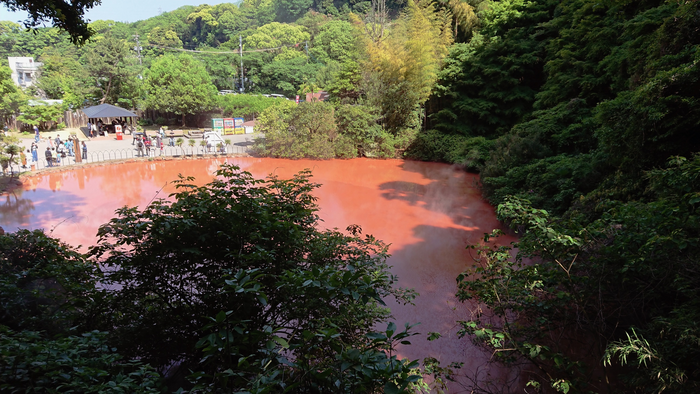Fukuoka, Japan—Nothing beats a good soak in a hot bath, and when it really hits the spot, you can almost feel your worries and ailments diffusing out into steam.

Credit: Satoshi Yamasaki
Fukuoka, Japan—Nothing beats a good soak in a hot bath, and when it really hits the spot, you can almost feel your worries and ailments diffusing out into steam.
Perhaps there is nowhere better to treat what ails you than the hot springs at the historical city of Beppu, located on the north-east shores of Kyushu. Not only does the city boast the most onsen—Japanese for hot springs—in the country, it is also a research hotbed for investigating the health benefits of onsen and treatments based on them.
In a paper published in Scientific Reports, researchers from Kyushu University’s Beppu Hospital report that onsen bathing in the evening hours is linked to lower prevalence of hypertension in Japanese adults over 65.
Humanity’s history with hot springs can be found as far back as ancient Egypt over 5,000 years ago. Onsen themselves are even referenced in Japan’s oldest books and creation myths, and people have touted the health benefits of soaking in hot springs well into the modern age.
In 1931, Kyushu University founded the ‘Onsen Therapy Research Institute’ in the historical city of Beppu to study the therapeutic benefits of onsen. Over the 90 years since, the institute has grown to cover a range of modern medical fields including internal and external medicine, rehabilitation, gynecology, and cardiology. Nonetheless, it still conducts research on the health benefits of onsen and continues to make a name for itself as a national hot spring treatment research center.
“In 2011, the institute partnered with the city and conducted a massive survey of Beppu residents over 65 about their health and onsen habits,” explains Satoshi Yamasaki, a Lecturer of internal medicine at the Beppu Hospital and first author of the study. “This is something we can uniquely do here in Beppu because onsen are a part of everybody’s daily lives, especially for the elderly. There are local onsen facilities everywhere, and you can even connect onsen to your home utilities.”
The survey collected information regarding medical history, onsen habits, and even the type of onsen frequented from over 11,000 people—nearly one-third of Beppu city residents over 65. Since then, researchers like Yamasaki have been going through the trove of data, analyzing the connection between health and onsen use.
“I wanted to find out if long-term onsen bathing had any preventative effects on hypertension. Past research has shown that traditional thermal therapy and hot spring bathing are effective against various diseases including hypertension,” continues Yamasaki. “In Japan especially, it is the leading cause of hospital visits and long-term prescription medication use.”
In their data set, the team was able to pull out 4,001 individuals who currently have, or a history of, hypertension. Their first analysis found that having hypertension also increased the likelihood for the individual to have a history of other pathologies.
“These were the usual suspects of pathologies correlated with hypertension such as gout, arrhythmia, renal disease, and diabetes,” Yamasaki explains. “But it was when we looked at an individual’s onsen habits that we found something interesting. We found that individuals who bathed in onsen after 19:00 were roughly 15% less likely to have hypertension.”
The team hypothesizes two main reasons for these findings: lower stress and faster sleep onset. Previous research has shown that faster onset of sleep can improve sleep quality and improved hypertension control. Moreover, thermal therapies such as sauna bathing have been shown to alter levels of stress markers in the blood and lead to better mitigation of hypertension.
“Of course, we must acknowledge some limitations in our study. Selection bias is expected whenever a questionnaire is used. We also could not account for the respondent’s daily lifestyle that could affect hypertension, or if they are being treated for hypertension medically or with onsen,” concludes Yamasaki. “Nonetheless, we found that habitual nighttime onsen bathing was associated with a lower prevalence of hypertension. To understand these results further, we will need more data from patients.”
###
For more information about this research, see “Hot spring bathing is associated with a lower prevalence of hypertension among Japanese older adults: a cross‐sectional study in Beppu,” Satoshi Yamasaki, Tomotake Tokunou, Toyoki Maeda, and Takahiko Horiuchi, Scientific Reports, https://doi.org/10.1038/s41598-022-24062-3
About Kyushu University
Kyushu University is one of Japan’s leading research-oriented institutes of higher education since its founding in 1911. Home to around 19,000 students and 8,000 faculty and staff, Kyushu U’s world-class research centers cover a wide range of study areas and research fields, from the humanities and arts to engineering and medical sciences. Its multiple campuses—including the largest in Japan—are located around Fukuoka City, a coastal metropolis on the southwestern Japanese island of Kyushu that is frequently ranked among the world’s most livable cities and historically known as a gateway to Asia.
Journal
Scientific Reports
DOI
10.1038/s41598-022-24062-3
Method of Research
Data/statistical analysis
Subject of Research
People
Article Title
Hot spring bathing is associated with a lower prevalence of hypertension among Japanese older adults: a cross‐sectional study in Beppu
Article Publication Date
14-Nov-2022




